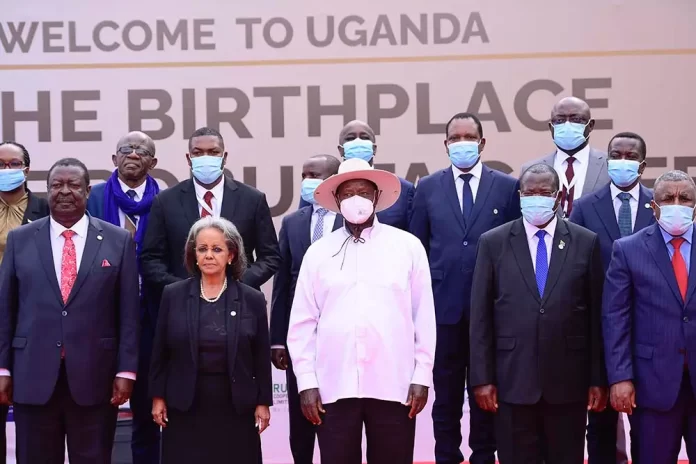
Leaders from coffee-producing countries in Africa are formulating strategies to halt the export of raw coffee beans. This initiative is aimed at elevating the income of farmers and curtailing the exploitation perpetuated by Western nations.
The proposal emerged during the second meeting of the G-25 African Coffee Summit, held in Munyonyo on Tuesday, August 8, 2023, where all participants at the summit unanimously emphasized that, for Africa to capitalize on the lucrative coffee industry, the continent’s producing nations must assume control and dominance within the market.
While opening the summit, President Yoweri Museveni presented statistics demonstrating that even though Africa contributes a significant portion of coffee to the global market, the producing countries reaped the least benefits from the coffee economy.
President Museveni added that, all is not lost as the situation can be reversed by emphasizing the imperative for coffee-producing nations to enhance the value of their crop.
He contended that, this approach will not solely amplify revenue derived from the coffee industry, but will also engender increased local employment opportunities, thereby mitigating the escalating unemployment rates.
The President underscored the viability of prohibiting the export of raw coffee and rectifying the inequitable international market dynamics.
He told to the delegates that, Uganda has already taken steps in this direction by imposing export bans on various raw materials, including valuable minerals such as uranium, copper, wolfram, and iron ore, along with currently sought-after resources like lithium.
The concept of prohibiting coffee exports is not novel, having been deliberated upon by various nations. Tanzania, for instance, has previously attempted such a measure, and in 2019, Kenya also endeavored to implement a law with a similar aim.
Nonetheless, uncompromising external factors and the influence of international market dynamics have consistently thwarted these efforts. To effect a transformation, African coffee-producing countries have united under the G-25 forum, where they seek to consolidate their voices and forge a collective stance. The inaugural summit took place last year in Nairobi.
Manssour Bin Mussallam, the Secretary-General of the Organization of Southern Cooperation said that, it is quite perplexing that among the leading coffee-exporting nations, none actually possess coffee plantations, but they procure raw coffee from African countries and capitalize immensely on this trade.
Manssour’s revelation surprised delegates particularly when considering that countries like Germany, devoid of coffee trees, are amassing substantial profits from this enterprise.
President Sahle-Work Zewde of Ethiopia emphasized that, implementing value addition has the potential to significantly improve the lives of those involved in the coffee supply chain, starting with the farmers.
She emphasized the importance of a concerted and intentional endeavor by individual countries and collaborative efforts within the forum.
President Zewde observed that, governments must enhance financial support and allocate additional resources to the sector in order to effect this transformation. This is particularly crucial considering the prevailing reality that a majority of African farmers continue to rely on traditional tools and methods.
The delegates also echoed the need to create local consumption market of coffee urging that this is possible with value addition by African countries to avoid natives from purchasing imported coffee products.














